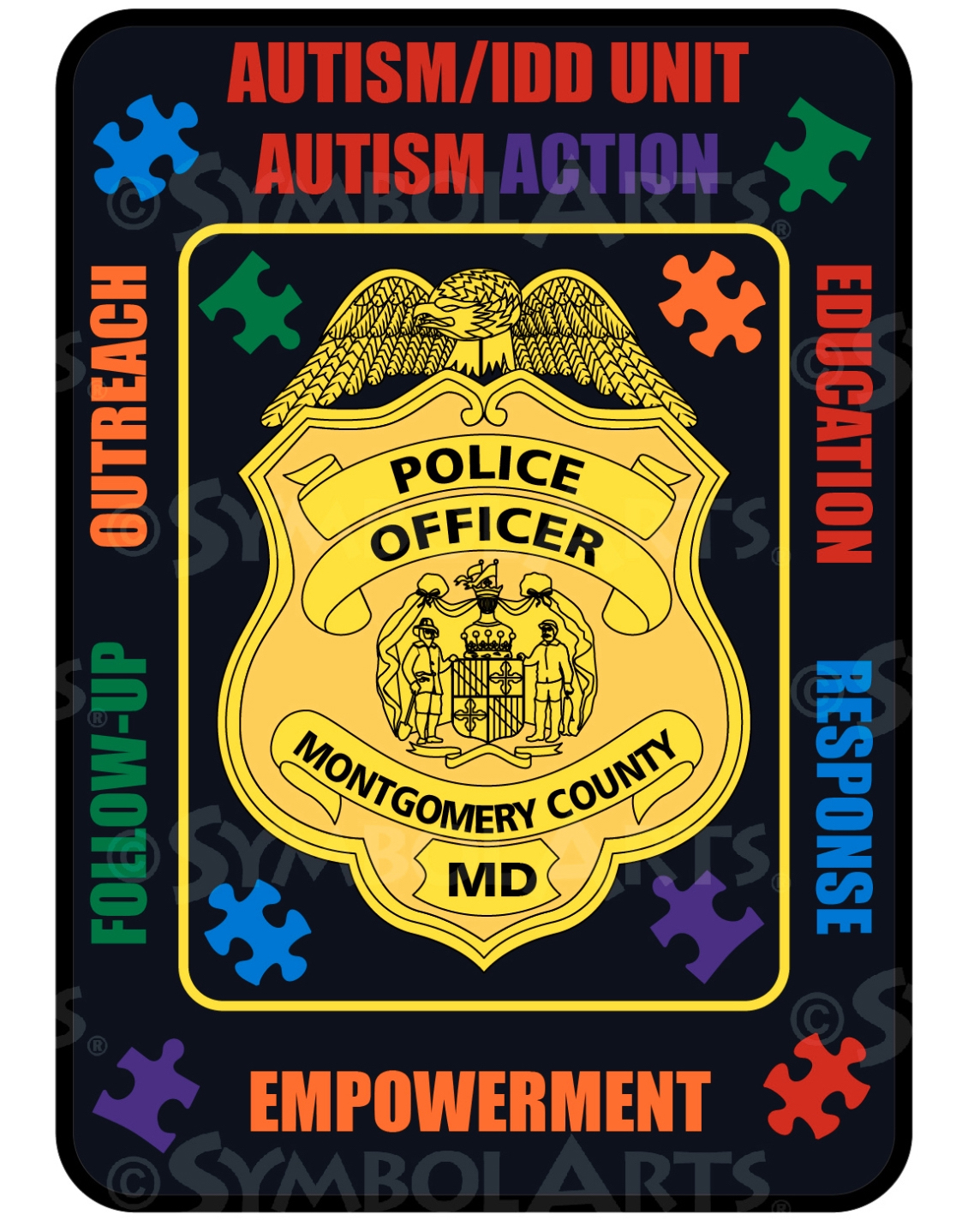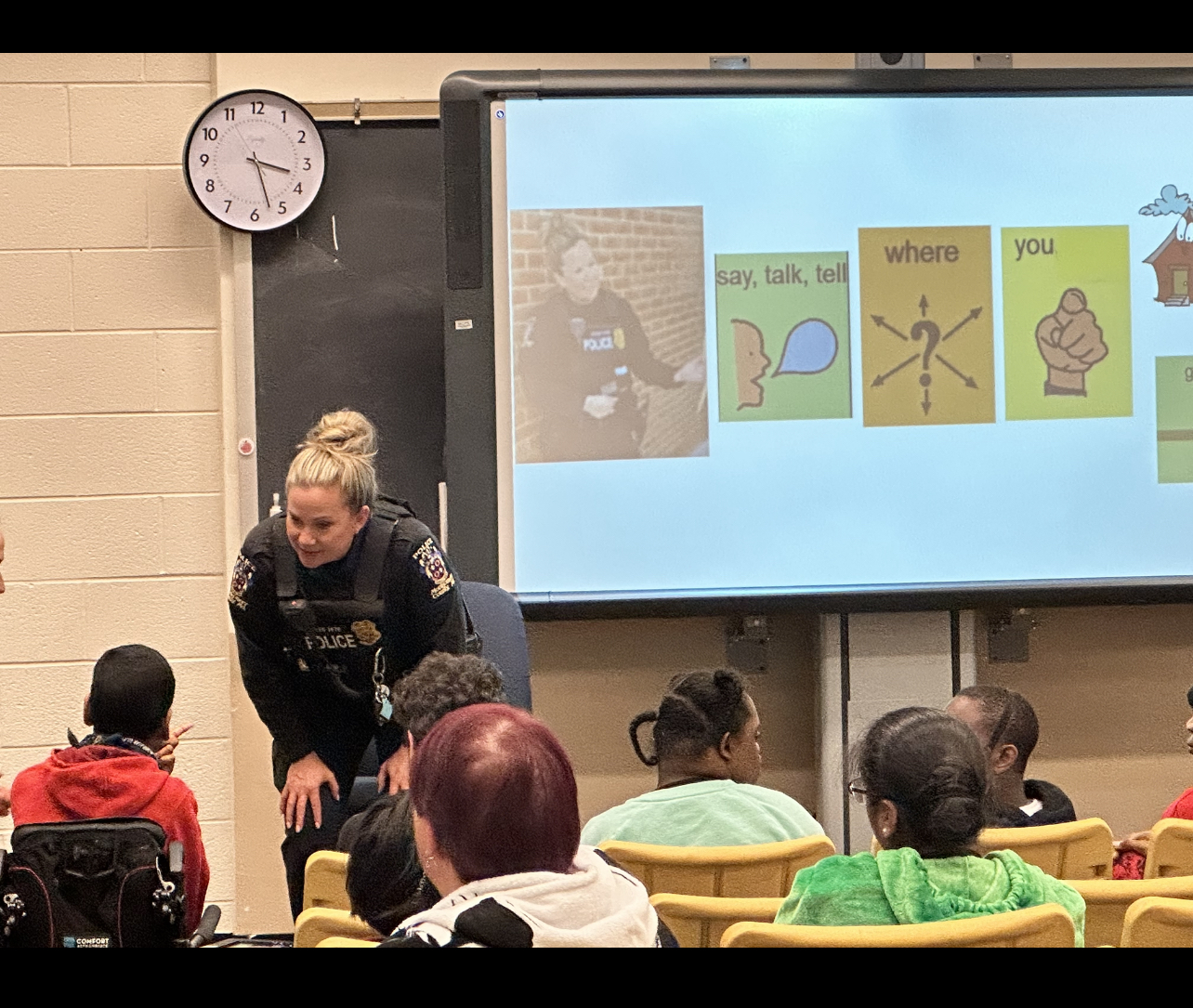Contact Us
To provide feedback on the Community Policing Dispatch, e-mail the editorial board at CPDispatch@usdoj.gov.
To obtain details on COPS Office programs, publications, and resources, contact the COPS Office Response Center at 800-421-6770 or AskCopsRC@usdoj.gov

U.S. Department of Justice
Office of Community Oriented Policing Services
Washington, DC 20530
 The Montgomery County (Maryland) Police Department (MCPD) Autism/IDD, Alzheimer’s, Dementia Unit was created in 2005 by Officer Laurie Reyes in response to the growing number of calls for service regarding community members with autism, dementia, or other intellectual or developmental disabilities (IDD) who were wandering or in crisis. Montgomery County police faced challenges specifically in responding to community members with autism, including responding to older persons and to calls of a more serious nature. Officer Reyes began with the goal of creating awareness, but soon realized that action was also needed. The Autism/IDD unit provides a layered approach to action through training, outreach, follow-up, empowerment, and response. The unit is now housed within the larger MCPD Crisis Intervention Team (CIT), which allows for collaboration and resource-sharing.
The Montgomery County (Maryland) Police Department (MCPD) Autism/IDD, Alzheimer’s, Dementia Unit was created in 2005 by Officer Laurie Reyes in response to the growing number of calls for service regarding community members with autism, dementia, or other intellectual or developmental disabilities (IDD) who were wandering or in crisis. Montgomery County police faced challenges specifically in responding to community members with autism, including responding to older persons and to calls of a more serious nature. Officer Reyes began with the goal of creating awareness, but soon realized that action was also needed. The Autism/IDD unit provides a layered approach to action through training, outreach, follow-up, empowerment, and response. The unit is now housed within the larger MCPD Crisis Intervention Team (CIT), which allows for collaboration and resource-sharing.
In the early stages of the unit’s development, Reyes started training Montgomery County Police officer recruits. To gain the knowledge to teach the curriculum to officers, Reyes embedded herself in the communities of autism and other intellectual and developmental disabilities, talking to affected individuals as well as caregivers, professionals, and teachers, all of whom wanted to share tools law enforcement could put in place to assist the autism/IDD community.

Reyes used social media and local media to get the word out that the MCPD was training officers in these interactions and that families should call 911 if their loved one was in need. She began presenting and meeting with families, sharing what the department needed from them to successfully interact with them and their loved ones. As officers started to respond to more and more calls, they too shared what worked and what didn’t work. Reyes continues to incorporate her experiences and those of other officers into her training to ensure it remains fluid and up to date.
A core part of the MCPD Autism/IDD unit’s practice is the follow-up. During the formation of the unit, Reyes conducted follow-ups, via phone or in-person, with people who called 911 for assistance. The follow-up has remained a critical tool in building community relationships. A simple call or home visit can go a long way to build trust: One of the first things officers say during a follow-up is “we are here for you.” Officers share that they will do their best to provide what community members need. Reyes knew individuals who have autism or other IDD and their families needed to see officers in uniform hosting autism/IDD specific events, so the unit, along with community partners, created and hosted the MCPD Autism/IDD Night Out—the first event of its kind, but not the last. The turnout at these events has been incredible and has given officers and families an opportunity to get to know each other and helped families in need locate resources.

Empowerment also means never underestimating a person who has autism or other IDD. The MCPD partnered with Pathfinders for Autism to develop and implement an Autism/IDD Driver Safety Class to help ensure all community members ca navigate the roads at their full level of independence. The unit provides instruction to special needs public and private school students on ways they can stay safe in the community and disseminates the MCPD Wandering Safety Kit, which provides families with the tools to keep a loved one safe who may wander.
One such young man, who has autism, was the focus of several searches. This young man’s family was always willing to speak to the media soon after a wandering episode and share how important it is to call 911 if a loved one has wandered. Reyes decided this youth and his family needed a Chief’s Award for their trust in the department—the first of many such awards handed out to families and individuals. Local and national news covered these awards; the stories sent a message to other families that the MCPD was there for them.
MCPD officers deliver a response which contains training, experience, and compassion. Officer Reyes says that the response is the most important part of the culture of action. Consistently, Reyes hears from families how officers go above and beyond. The MCPD and partnering agencies respond to hundreds of calls a year involving those in the autism/IDD community, from the mundane to the very serious. Officers respond with the tools and training needed to ensure that an individual, their family, and the community will receive a positive, safe, effective resolution. More than just autism/IDD awareness, this is action.
Further Information:
- News video describing the program and MCPD Ambassador
- Pathfinders partnership with MCPD
- News coverage of Autism/IDD Driver Safety Class
Images courtesy of Montgomery County Police Department.
Officer Laurie Reyes
Coordinator
Montgomery County Police Autism/IDD, Alzheimer’s, Dementia Unit
Laurie.reyes@montgomerycountymd.gov
Subscribe to Email Updates
To sign up for monthly updates or to access your subscriber preferences, please enter your email address in the Subscribe box.






